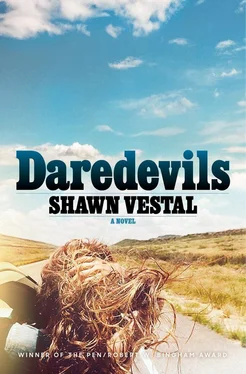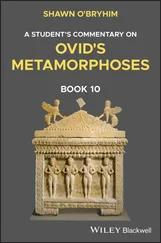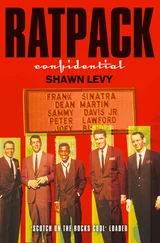• • •
It is Dean’s night. She finds it more unbearable than usual. He smells like a sour washcloth, and the mole on his neck is grotesque and wrinkled, and his face is contorted into a twisted grimace that lacks all self-consciousness, all reserve, and she knows she will never be able to be someone who has not experienced this. He is marking her.
Afterward, she says, “I was wondering, since we’re not going to church here, if it makes sense for me to be going to seminary. I mean, will it make sense to them ?”
Dean seems stumped. He lies on his back in his garments. The prickly black hair that covers his body presses against the sheer white material in swirls and eddies. He rubs his eyes with the heels of his hands, starts to speak, rubs them again.
“Huh,” he says. “Well, little sister, you may be right there. You may be.”
He falls silent. He drums his fingers on his chest, gazes at the ceiling. Something washes over him afterward, some lassitude. Loretta wonders whether he’ll come at her again. He’s frustrated that she isn’t yet pregnant, because he believes himself so fertile. His fertility is an expression of his righteousness. She has kept her methods a secret, and yet she understands that it is starting to be taken in the household as a failure, a failure of righteousness and belief and commitment, a failure for which blame will be located and assigned.
“Maybe I should stop going,” she says, grazing his beard with her fingertips.
“Maybe,” he says. “We’ll see.”
Waiting in the LeBaron for Loretta, Jason spots a jackrabbit perched on a rock at the back of the yard, spindly ears high. His duff color blends with the morning twilight. He’s barely visible, and he doesn’t move as Loretta scuttles out and slides in.
“Look at that guy,” he says. “Just watching us. He’s not even scared.”
“Dean says we’ve got to do something drastic.”
“We were using carrots before.”
“What — feeding them?”
“Yeah. You cut them up, soak them in strychnine, and then lay out a line of them along the edge of the field. You’ve got to start with some nonpoison ones first. Works pretty good. We were hauling eight or ten a day out of there for a while.”
She doesn’t answer.
He says, “We tried some other poisons, too. In barley.”
“Dean says you can’t shoot ’em or poison ’em fast enough.”
They’re actually talking. Okay, Jason, he thinks. Keep it going .
He says, “Yeah, that’s what my grandpa said, too.”
“He wants to have a drive.”
A drive. A bunny bash. Herd the rabbits into a circle of men, who club them to death. Regular people had stopped doing them. The New York Times had written up the last one, over in Mud Flats, and run a photo of a bloody-shirted father-and-son bashing team. It became a big deal, and everyone got defensive. The gas stations sold bumper stickers with a cartoon image of a hippie hugging a bunny, set inside a gun sight. The local papers ran editorials about big-city animal lovers, and the letters were full of righteous indignation about liberals, hippies, environmentalists, the media. Jason had never seen a drive, and he didn’t care about jackrabbits. Sometimes he and Boyd would take.22s out and try to shoot them in the desert, though the rabbits mostly bounded away untouched. But if there is anything he doesn’t want right now, it’s more weird attention at the farm.
“Great,” he says, sarcastically. “That’ll be super cool.”
“I don’t know,” she says. “They’re just a bunch of stupid rodents. Gotta get rid of ’em somehow. Dean says they ate up about half the crops.”
A revelation sprints across Jason’s mind, illuminated by her defensiveness: She would be having sex with Dean, of course. She would be — What? Every other night? On some kind of schedule? — welcoming Dean into her room. His creepy uncle would climb on and get to it, grunting and farting, probably, and covered with moles and bristly hairs. Holy goddamn shit . Jason thinks he will puke. She would hate Dean, of course. She must. Jason could think of her only that way. But even so, she would find herself aligned with him against others.
Loretta reaches over and turns on the radio. Jason notices her knuckles are large and red for such trim, tapered fingers. Like she pops them too much. He welcomes every unflattering detail. The radio is set at his dad’s AM country station, KART. They listen to that awful music—“Grandma’s Feather Bed,” “Rhinestone Cowboy,” the hideous sound track to his life — all the way to town, while she hums along.
• • •
At lunch, Jason doesn’t say anything to Boyd about Loretta, and Boyd doesn’t ask. Boyd says he’s thinking about seeing if his mom would let him borrow her car to drive to South Dakota for a demonstration in support of Jonathan Raincounter.
“Dude’s getting hosed,” Boyd says.
“Who’s he again?”
“Man, you have got to pay some goddamn attention.”
Boyd reminds him: Jonathan Raincounter was an Oglala Sioux, unjustly imprisoned for shooting two FBI agents. Most people Jason knows take a different view of the case than Boyd; most people he knows see the case — Indians shooting FBI agents! — as one more sign that they have entered the last days, that the sinful world is tinder dry and ready to burn with apocalyptic fire, that the approach to the Second Coming of Jesus Christ is nigh, and that the righteous will soon be heaved upward by the Lord, for that reason and many others, including the following:
Nudity and sex talk in movies
Filthy rock and roll
Women’s lib
The Equal Rights Amendment
Tight blue jeans
Rampant sexual perversion and immorality
Unshaven men with long hair
Roe v. Wade
The fall of Saigon
Jackrabbits eating farmers out of house and home
Queers and hippies marching in the streets of the cities
Liberals attacking the family
The end of the gold standard
Drugs
Oil shock
Creeping federalism
Communists
It is the entire context for Jason’s people. Their atmosphere. They are the Lord’s chosen, saved for the last days, when wickedness will overrun the planet until Christ returns and cleanses the earth for a millennium — a thousand years of fire — followed by the three-tiered afterlife, in descending order of glory. It is coming, it is nearer every day, it is all around them.
What Jason always wonders is: If we’re living in the last days, why are we living like this? School, work, church, chores, bills, striving, arguments, chastity, oil changes, milking cows, cutting hay? He wants to live like time is running out. Like the hippies at the Snake River Canyon. Like Evel Knievel. Like driving to South Dakota to raise forbidden hell. Like falling in love with his uncle’s second wife. Like precious time is really, actually running out instead of plodding along forever.
“What do you think you can you do about it?” Jason asks.
“Not a thing.”
“Then why go?”
“Fun. Adventure. Freedom. Just to be on the right side of things for once.” He waves his fork around, a gesture that encompasses not just the cafeteria, with its folding tables in the space between the auditorium seating and the stage, but their entire universe. “This place . The fucking Indian jokes. The retarded politics. I mean, people here still like Nixon, man.”
Jason’s parents still like Nixon. A couple of popular thugs walk past in their letterman’s jackets, red felt with black leather sleeves. One of them says, “What are you staring at, Tonto?”
Boyd says, “Nothing, George,” and flips them off.
Читать дальше












